Extruded Polystyrene (XPS) Rigid Insulation Board is a high-performance, durable thermal insulation material widely used in construction and industrial applications. Made from polystyrene foam, XPS boards are characterized by their closed-cell structure, which gives them excellent thermal insulation properties and resilience under various environmental conditions.
SOHO Extruded Polystyrene Rigid Insulation Board combines superior insulation properties with high durability and moisture resistance, making it an ideal choice for a variety of thermal insulation needs in construction, infrastructure, and industrial applications. Additionally, our Extruded Polystyrene (XPS) Rigid Insulation Board incorporates Low Internal Stress Technology, a proprietary innovation that significantly enhances the material's performance, stability, and durability. Our extruded polystyrene insulation board offers enhanced dimensional stability, a lower thermal conductivity coefficient, and exceptional pressure resistance. It is also non-toxic, eco-friendly, and fully aligned with green building standards. Contact us now and get more details!
SOHO Extruded Polystyrene (XPS) Rigid Insulation Board features Low Internal Stress Technology, a patented innovation that greatly improves the product's performance.
Low internal stress technology (SOHO core patent) is the use of multiple foaming equipment for multiple foaming of materials, so that fluorine-free, bromin-free low internal stress extrusion (XPS) extruded polystyrene board to achieve 100% perfect foaming, its dimensional stability than the traditional extrusion board more than double, the closed-cell extruded polystyrene foam can be made. The technology to overcome the world decades of unsolved extrusion board dimensional stability aging instability problem, Deformation, cracking, falling off and other drawbacks will not be repeated.
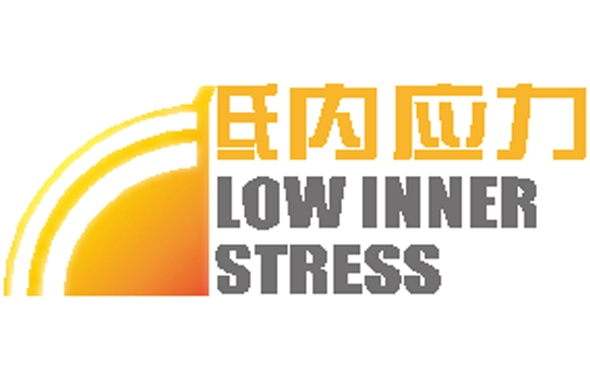
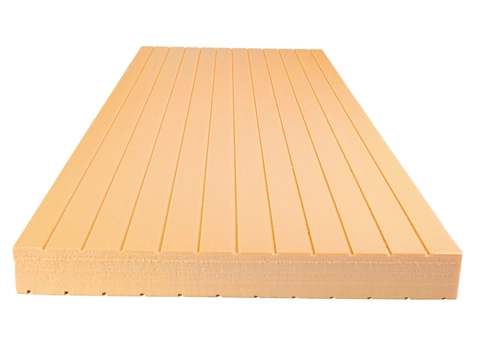
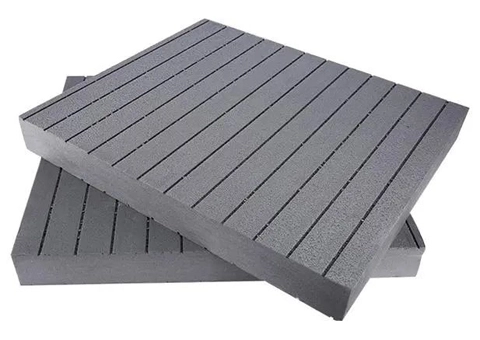
Extruded polystyrene insulation board (XPS) is a rigid foam insulation material made from polystyrene, produced through an extrusion process. This process creates a dense, closed-cell structure that provides excellent thermal insulation and moisture resistance. SOHO's extruded polystyrene insulation board leverages innovative Low Internal Stress Technology. This technology utilizes multiple foaming equipment to achieve optimal material foaming, resulting in a fluorine-free and bromine-free product.
High Thermal Performance: XPS extruded polystyrene thermal insulation boards offer superior R-values, ensuring effective insulation that helps maintain indoor comfort and reduce energy costs.
Moisture Resistant: The closed-cell design prevents water absorption, making XPS ideal for areas exposed to moisture, such as below-grade applications and exterior walls.
Dimensional Stability: XPS extruded insulation board maintains its shape and performance over time, resisting warping, cracking, and deformation under varying temperature and humidity conditions.
Longer durability: It overcomes aging stability issues common in traditional materials and is resistant to compression and structural loads, making it suitable for high-performance applications.
Lightweight and Easy to Handle: Extruded polystyrene boards are lightweight, simplifying installation and reducing labor costs.
Environmental Safety: Fluorine-Free and Bromine-Free. SOHO XPS insulation board products adopt environmentally friendly formulation, making them a safer choice for both the environment and indoor air quality.
Versatile Applications: Suitable for various applications, including residential, commercial, and industrial projects, providing flexibility in design and insulation solutions.
SOHO's Extruded Polystyrene Insulation Board is a superior choice for efficient and reliable insulation solutions. As a professional extruded polystyrene board manufacturer, Beijing SOHO provides different types of extruded polystyrene insulation boards, including extruded polystyrene XPS board, Graphite Insulation Board, and High Compressive Strength XPS. If you need anything, please feel free to contact us and get the extruded polystyrene insulation board price.
Extruded polystyrene boards are widely used in drywall insulation, flat concrete roofs and steel structure roof insulation, moisture-proof insulation on low-temperature storage floors, lower layers of low-temperature floor radiant heating pipes, parking platforms, airport runways, highways, etc., to control ground freezing. It is an inexpensive and high-quality thermal insulation and moisture-proof material for the construction industry.
Extruded boards can be used for basic pavements, airport roads and highway basic pavements.
It has the advantages of waterproofing, moisture-proof, corrosion-proof, and durability, and can effectively alleviate foundation collapse caused by road leakage;
Extruded polystyrene board is an indispensable material in cold storage construction.
It not only plays the role of heat insulation, but also can absorb and buffer a small amount of water vapor condensation, reducing the formation of water droplets due to the microporous structure of the extruded plate surface. The requirements for extruded boards for cold storage are high and the thickness is greater than 10cm. Therefore, in the construction of cold storage, two layers of extruded boards are usually used, one layer is to increase the thickness, and the other layer is to stagger and splice two layers of extruded boards to improve the thermal insulation performance and avoid temperature loss;
Extruded polystyrene boards can be used for thermal insulation of exterior walls and roofs.
Extruded polystyrene boards are lightweight and easy to use. Class B1 and B2 extruded polystyrene boards can avoid becoming combustible and causing major accidents in the event of a fire. They can also add heat to buildings. A layer of insulation to save energy. Extruded polystyrene boards are widely used in various fields due to their advantages such as heat insulation, waterproof, moisture-proof, light weight, and pressure resistance. In today's society, in order to pursue low carbon and environmental protection, extruded boards can be reused for exterior wall panels, and thermal insulation layers can be added to buildings to save energy.
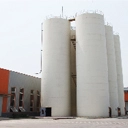
The dust-free storage equipment uses environmentally friendly raw materials such as BASF and does not produce harmful gases. The production process also reflects the concept of environmental protection.
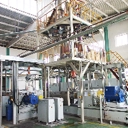
The world's most advanced measurement control system, the accuracy can reach ±1g.
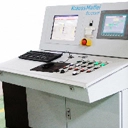
The error of loading materials can be controlled within 2mg.
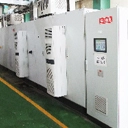
Precise temperature control process with an error of plus or minus 2 degrees Celsius.
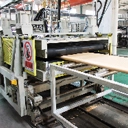
It has a very high level of automatic control and is an internationally advanced production equipment in the industry.
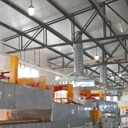
The product's cells can be foamed up to more than 99%.
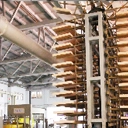
The heat inside the dissipated board is completely released, reducing the risk of deformation.
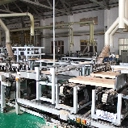
Ensure the plate size is more accurate.
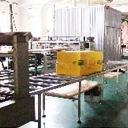
Fully automatic packaging to reduce losses during transportation.
Germany's KraussMaffei extruded board production line has advantages that domestic extruded board production lines do not have, such as high degree of automation, comprehensive industrial production, precise and adjustable large-scale data, accurate measurement, and stable operation.
When comparing XPS (Extruded Polystyrene) insulation boards to EPS (Expanded Polystyrene) insulation boards,XPS extruded polystyrene board is known for its superior thermal performance and moisture resistance, thanks to its dense, closed-cell structure. This makes XPS extruded polystyrene insulation board particularly effective for applications in harsh environments, such as below-grade foundations and roofing systems, where exposure to water is a concern. In contrast, EPS features a lighter, open-cell composition, which, while more cost-effective, offers lower R-values and is more susceptible to moisture absorption. Additionally, XPS boards are resistant to deformation and aging, ensuring long-term performance without the risk of sagging or compressing over time. Their robust structure also provides excellent compressive strength, making them suitable for high-load applications. Although XPS is generally more expensive, its durability and efficiency make it a preferred choice for high-performance insulation needs, whereas EPS is often favored in projects where budget and weight are significant considerations.

While XPS extruded insulation board is not widely recycled, some facilities accept it for recycling. However, it is best to check with local recycling centers for specific guidelines.

Compared to other insulation materials, XPS offers a higher R-value per inch, better moisture resistance, and is less prone to damage from pests or moisture compared to fiberglass or cellulose.

Yes, extruded polystyrene boards are suitable for outdoor applications, especially below grade or as part of a waterproofing system due to their resistance to moisture.

Extruded Polystyrene (XPS) Insulation Board products are globally defined as articles, which do not require Safety Data Sheets according to chemical laws in the following:
United States
Canada
European Union (EU) and other Europe/Middle East/African (EMEA) countries
Asia Pacific countries (including Australia, China, Japan, South Korea, Thailand, etc.)
The XPS Board listed does not release or otherwise result in exposure to a hazardous chemical under the intended conditions of use and meet all other listed requirements of an article. Therefore, these products meet the global definitions of articles which do not require SDS creation or distribution.

Section 803.1.2 of the 2021 International Building Code (IBC) specifies Class A, Class B, and Class C requirements. Although insulation materials can be used as a finish material or as a material imbedded in the wall assembly, this classification scheme can be used to describe the basic classification of the fire properties of foam plastic insulation. Our rigid foam insulation boards belong to Class B.
If you want to know more about our products, please leave a message or give us a call and we will get back to you as soon as possible.